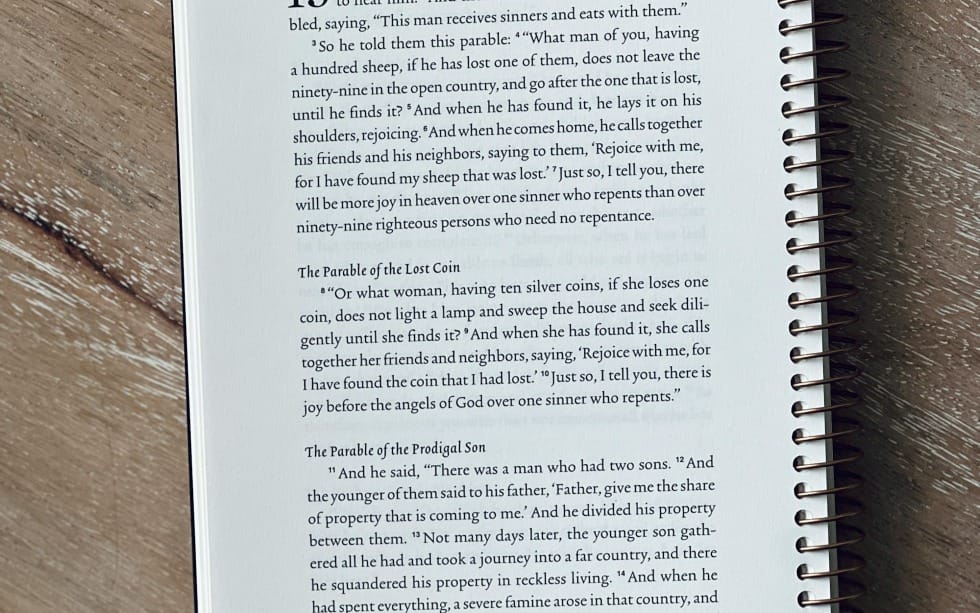Do You Know the "Real Story" of the Prodigal Son?
What comes to mind when you read the story of the Prodigal Son? If you’re like many Christians, you have a pretty good grasp of this story and might be able to fill in most of the details. But maybe you've missed the most important part.

What comes to mind when you read the story of the Prodigal Son?
If you’re like many Christians, you have a pretty good grasp of this story and might be able to fill in most of the details. Luke 15 gives us this narrative, and it comes after Jesus has given a series of calls to repentance, miraculous healings, and parables. Jesus is speaking to two groups of people—tax collectors and sinners and the Pharisees and scribes.
As Timothy Keller notes, the first group “observed neither the moral laws of the Bible nor the rules for ceremonial purity followed by religious Jews. They engaged in ‘wild living.’ Like the younger brother, they ‘left home’ by leaving the traditional morality of their families and of respectable society. The second group of listeners was the ‘Pharisees and the teachers of the law,’ who were represented by the elder brother.”[1]
This parable tells the story of a younger son who demands his inheritance from his father. Not only was this request a sign of tremendous disrespect, but it was also extremely humiliating for the father. In a time when generational wealth was tied to land, this would have meant that the father would have split his land in two. N.T. Wright says, “The shame that this would bring on the family would be added to the shame the son had already brought on the father by asking for his share before the father’s death; it was the equivalent of saying ‘I wish you were dead.’”[2]
After squandering his wealth, the prodigal son returns home. We see the father running to greet his son, an act seen as undignified and certainly not what his son deserved. For many readers today, this is the climax of the narrative. But it’s actually only the first part. The second part is the role of the elder brother, who wants nothing to do with celebrating his younger brother’s return.
In The Prodigal God, Timothy Keller notes that “Jesus uses the younger and elder brothers to portray the two basic ways people try to find happiness and fulfillment: the way of moral conformity and the way of self-discovery.”[3] The younger son’s actions would have been easy for the religious leaders to condemn because they were so blatantly wrong. However, the reactions of the elder son are more subtle, and the fact that Jesus lumped both brothers into the same story would have infuriated the religious leaders. Keller writes,
Through this parable Jesus challenges what nearly everyone has ever thought about God, sin, and salvation. His story reveals the destructive self-centeredness of the younger brother, but it also condemns the elder brother’s moralistic life in the strongest terms. Jesus is saying that both the irreligious and the religious are spiritually lost, both life-paths are dead ends, and that every thought the human race has had about how to connect to God has been wrong.[4]
The problem for many professing Christians is they have subtly adopted an elder brother mindset. They’ve been good, they’ve kept the rules, and they say all the right things. They aren’t like those who have squandered their lives. And with this thinking comes a bit of entitlement. They start to think that God owes it to them to bless their family, health, and church activity. Why? Because they are “good” people.
Keller writes, “Elder brothers obey God to get things. They don’t obey God to get God himself.”[5] He adds, “If, like the elder brother, you believe that God ought to bless you and help you because you have worked so hard to obey him and be a good person, then Jesus may be your helper, your example, even your inspiration, but he is not your Savior. You are serving as your own Savior.”[6]
If you resonate with the younger brother, this story is a beautiful reminder of God’s redemption and that he wants people like you to sit at his table. But maybe you’ve realized that you have more of the elder brother nature inside of you than you’d like to admit. You judge others, frequently criticize Christians who are different from you, and grow impatient with those who “just can’t seem to get their lives together.” In your mind, the Christian life should be a meritocracy, with those who have done more good receiving more celebration.
Maybe you feel bitter at God because you feel like you’ve served him for years and done all you were supposed to do, and yet other “undeserving” people are farther ahead, and God has blessed them in ways he hasn’t blessed you. Secretly, you despise their success, find little ways to undermine them, and justify your hard work and righteous lifestyle.
If this is where you are today, God wants to deal with your heart. He wants you to stop trying to earn what you never can and release you from internal resentment towards others that is corrupting your soul. Yes, maybe he wants to use you to bring lost prodigals home. But he also wants you to learn to have his heart for others and see them as he sees them.
*Unless you specify otherwise, comments and questions you ask may be featured in upcoming podcast episodes.
[1] Timothy Keller, The Prodigal God: Recovering the Heart of the Christian Faith (Penguin Publishing Group, 2008), 7.
[2]N. T. Wright, Luke for Everyone, vol. 4 of Accordance electronic ed. (Louisville: Westminster John Knox Press, 2011), 187.
[3] 29.
[4] Timothy Keller, The Prodigal God: Recovering the Heart of the Christian Faith (Penguin Publishing Group, 2008), 10.
[5] Timothy Keller, The Prodigal God: Recovering the Heart of the Christian Faith (Penguin Publishing Group, 2008), 42.
[6] Timothy Keller, The Prodigal God: Recovering the Heart of the Christian Faith (Penguin Publishing Group, 2008), 38.





